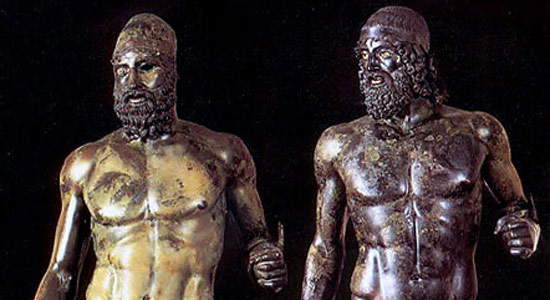Riace Bronzes: why it was a wise decision not to bring them to the Expo
This morning I found myself reading a precise and timely article in the Huffington Post written by Michele Dantini about the negative opinion of the MiBACT commission on the transfer of the Riace bronzes to Milan in view of the Expo. Meanwhile, there is one thing to clarify. This commission was not composed of obscure and gray bureaucrats, but rather of some of the most important personalities in the field of art history in Italy (and beyond): let us mention only Giuliano Volpe, an established archaeologist among the most experienced in the field, and Bruno Zanardi, one of the most celebrated restorers internationally. So not exactly the latest arrivals, and certainly people who do not move based on political interests, something Vittorio Sgarbi would seem to be convinced of instead.

The Commission’s decision finally puts an end to a pointless and specious controversy that has dragged on throughout the summer and involved dozens of parties. Even us, who intervened on the subject. Beyond the controversy, the commission’s decision can only be welcomed by those who think that art history still has something to teach. So, it can be said that it was a wise decision to decide not to bring the Riace bronzes to Expo 2015. For several reasons.
First of all, there was the impression that the Riace bronzes found the only legitimacy for their relocation in the desire to subject them to theinflux of tourists that will affect Milan during the days of the Expo. As much as this has since given rise to debates centered on a pure and sterile parochialism that will lead nowhere, the MiBACT’s decision establishes a first firm point: the logics of preservation cannot take second place to those of usability by the public. Here on Finestre Sull’Arte, we have a section of the site devoted to travel. But the responsible traveler is well aware that his needs must necessarily stop where those of conservation of the territory he visits, and of course of the works preserved there, begin. To jeopardize the safety of two works that are fundamental to the history of art, in order to bring them to an exhibition that looks as if it will be set up without scientific, let alone popular, criteria, is certainly not what art lovers want.
And in this, the commission has been clear: as stated in the note released last Wednesday on the Ministry’s website, the bronzes cannot be moved because it is not possible to exclude “any prejudice to their integrity and preservation.” Which, put in simpler terms, means that the commission’s experts believe that during the move the works could suffer damage that could threaten the integrity of the statues and their preservation. The commission, the note goes on to say, has determined that there are “various conservation problems in the sculptures,” such as “numerous and widespread micro-cracks, problems with the sealing of ancient welds that have caused a weakening of the structural seal.” And that should be enough to close the debate: if the experts felt that a move could have caused damage, it is wise not to move the bronzes.
Then there is an additional reason why the MiBACT commission’s decision should be considered wise. That is, the moving of the Riace bronzes had begun to take on political connotations (both on the part of those who supported the reasons for the move and those who opposed it) that have very little to do with art history. And these political contours are gaining momentum these very days. Here, the decision underscores an important concept: the value of art history is universal and its values are perpetual. No matter how much a legal or political institution, as Michele Dantini rightly points out in her article, may perish at a given moment in history, the values that works of art can convey are destined to remain. From the MiBACT commission’s decision we are able to draw this lesson.
Finally, one last consideration. Beyond all that has been said in recent months, we are convinced that Expo 2015 will be a beautiful event that can really bring prestige to our country. Even without the Riace bronzes. And it can be an opportunity to get Italy going again and make it great again.... we will have to try to do everything we can to seize it.
Warning: the translation into English of the original Italian article was created using automatic tools. We undertake to review all articles, but we do not guarantee the total absence of inaccuracies in the translation due to the program. You can find the original by clicking on the ITA button. If you find any mistake,please contact us.




























